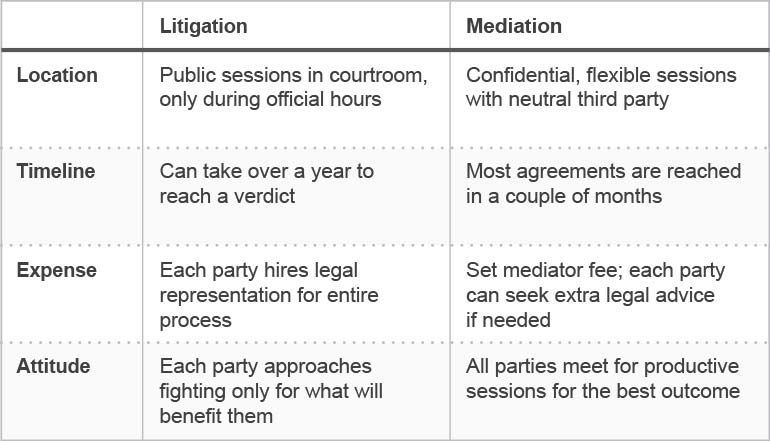Answering Questions About Family Law Mediation
If you are facing a divorce, navigating issues of child custody and support or any other family law issues, you most likely understand that there is a prominent emotional factor that can permeate the proceedings, often making it difficult to achieve resolution. Mediation can help minimize the drama, but at Tournour Law, we want to make sure you have all of the information you need to make an informed decision about mediation. Our attorney in East Brunswick, Frank Tournour, wants to answer any questions you might have regarding mediation for your family law case. To get you started, we’ve provided answers to a few common questions below.
How does mediation compare to litigation?
The chart below offers a side-by-side comparison that can help you better see some of the benefits to mediation.

What is a mediator?
In simplest terms, a mediator is an attorney or retired judge who serves as a neutral third party. The mediator’s job is to ensure that every party’s interests and goals are conveyed objectively in order to achieve a timely agreement with which all parties feel satisfied.
When can mediation help?
Mediation can be beneficial in a variety of family law matters, including:
- Divorce
- Child custody
- Child support
- Property division
- Alimony
- Prenuptial agreements
During your consultation, you can depend on our attorneys to determine whether mediation is the right way to help you protect your best interests, as well as those of your loved ones. We can provide guidance on choosing the best type of mediator for your divorce and other related matters. Family law mediation often requires six to 12 sessions spanning several weeks.
What happens during mediation?
A typical mediation involves six steps:
- The mediator will introduce all attendees to one another and explain the specific goal of the mediation.
- The disputants will make their opening statements, in which they will explain their understanding of the dispute, how it affects them and how they hope to resolve it. When a disputant has the floor, he or she cannot be interrupted.
- The mediator will encourage discussion between disputants regarding their respective opening statements in order to determine exactly which issues need to be resolved.
- Each party will have the opportunity for a private caucus, a closed meeting with the mediator in which they can express any concerns up to this point in the discussion and brainstorm settlement ideas.
- Based on opening statements and private caucuses, the two parties can begin negotiating directly.
- If an agreement is reached, the mediator will begin writing the terms, and both parties will have an opportunity to review this language with their attorneys. If an agreement cannot be reached, the mediator will explain options such as continuing mediation, entering arbitration or going to court.
How long does mediation take?
Family law mediation often requires six to 12 sessions spanning several weeks.
How is mediation different than arbitration?
In simplest terms, arbitration results in a legally binding decision determined through a contested hearing that is very similar to a court proceeding. While arbitration has become a popular and cheaper alternative to going to court, the practice has drawn criticism from those who say the process can be more susceptible to bias.
Contact Us Today
Mediation can foster open, respectful and productive communication. If you want to explore options for mediation and avoid the stress and expense of litigation, contact our law firm online or call 732-913-3634 today and schedule a consultation. We can help you determine if mediation is right for you.
